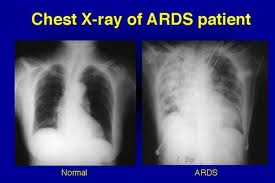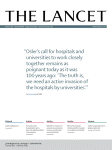Lancet:沙丁胺醇增加ARDS患者死亡率
2011-12-12 MedSci原创 MedSci原创
英国华威大学的Fang Gao Smith博士等近日在《柳叶刀》(The Lancet)杂志发表文章称,沙丁胺醇可增加急性呼吸窘迫综合症(ARDS)的死亡率。 这项已经停止的名为BALTI-2的临床试验称,在气管插管和机械通气的患者中,静脉输注沙丁胺醇组28天死亡率为34%,高于安慰机组的23%。分析结果表明,每9.2名使用β2受体阻滞剂的ARDS患者,将有一名患者因用药而死亡。 此前,名为B

英国华威大学的Fang Gao Smith博士等近日在《柳叶刀》(The Lancet)杂志发表文章称,沙丁胺醇可增加急性呼吸窘迫综合症(ARDS)的死亡率。
这项已经停止的名为BALTI-2的临床试验称,在气管插管和机械通气的患者中,静脉输注沙丁胺醇组28天死亡率为34%,高于安慰机组的23%。分析结果表明,每9.2名使用β2受体阻滞剂的ARDS患者,将有一名患者因用药而死亡。
此前,名为BALTI的II期临床试验表明,静脉内使用长达7天的沙丁胺醇可减少ARDS患者肺水肿和气道平台压力,而对28天死亡率无影响。
BALTI-2试验的目的是研究沙丁胺醇对死亡率的影响,进入该试验的326名患者被随机分为两组,分别在发病72小时内使用每小时15 μg/kg的沙丁胺醇或安慰剂,长达7天。
结果发现多数患者对沙丁胺醇无法耐受,经常发生心动过速、心律失常、乳酸酸中毒,以致于不得不停止治疗。除增加死亡率外,沙丁胺醇还减少了无机械通气和无器官衰竭的时间。
作者称,由于对死亡率的影响,该研究不得不停止,导致缺乏沙丁胺醇对心血管系统影响的数据,关于ARDS的多中心研究数据等,因此无法对沙丁胺醇的作用作出综合评估。但他们仍不建议对ARDS患者使用β2受体阻滞剂。

doi:10.1016/S0140-6736(11)61623-1
Effect of intravenous β-2 agonist treatment on clinical outcomes in acute respiratory distress syndrome (BALTI-2): a multicentre, randomised controlled trial
Prof Fang Gao Smith MD, Prof Gavin D Perkins MD , Simon Gates PhD , Duncan Young MD , Prof Daniel F McAuleyMD , William Tunnicliffe FRCP , Zahid Khan FRCA , Prof Sarah E Lamb DPhil , for the BALTI-2 study investigators.
Background
In a previous randomised controlled phase 2 trial, intravenous infusion of salbutamol for up to 7 days in patients with acute respiratory distress syndrome (ARDS) reduced extravascular lung water and plateau airway pressure. We assessed the effects of this intervention on mortality in patients with ARDS.
Methods
We did a multicentre, placebo-controlled, parallel-group, randomised trial at 46 UK intensive-care units between December, 2006, and March, 2010. Intubated and mechanically ventilated patients (aged ≥16 years) within 72 h of ARDS onset were randomly assigned to receive either salbutamol (15 μg/kg ideal bodyweight per h) or placebo for up to 7 days. Randomisation was done by a central telephone or web-based randomisation service with minmisation by centre, pressure of arterial oxygen to fractional inspired oxygen concentration (PaO2/FIO2) ratio, and age. All participants, caregivers, and investigators were masked to group allocation. The primary outcome was death within 28 days of randomisation. Analysis was by intention-to-treat. This trial is registered, ISRCTN38366450 and EudraCT number 2006-002647-86.
Findings
We randomly assigned 162 patients to the salbutamol group and 164 to the placebo group. One patient in each group withdrew consent. Recruitment was stopped after the second interim analysis because of safety concerns. Salbutamol increased 28-day mortality (55 [34%] of 161 patients died in the salbutamol group vs 38 (23%) of 163 in the placebo group; risk ratio [RR] 1·47, 95% CI 1·03-2·08).
Interpretation
Treatment with intravenous salbutamol early in the course of ARDS was poorly tolerated. Treatment is unlikely to be beneficial, and could worsen outcomes. Routine use of β-2 agonist treatment in ventilated patients with this disorder cannot be recommended.
本网站所有内容来源注明为“梅斯医学”或“MedSci原创”的文字、图片和音视频资料,版权均属于梅斯医学所有。非经授权,任何媒体、网站或个人不得转载,授权转载时须注明来源为“梅斯医学”。其它来源的文章系转载文章,或“梅斯号”自媒体发布的文章,仅系出于传递更多信息之目的,本站仅负责审核内容合规,其内容不代表本站立场,本站不负责内容的准确性和版权。如果存在侵权、或不希望被转载的媒体或个人可与我们联系,我们将立即进行删除处理。
在此留言









学习了
120
#患者死亡#
75
#RDS#
67
#Lancet#
87